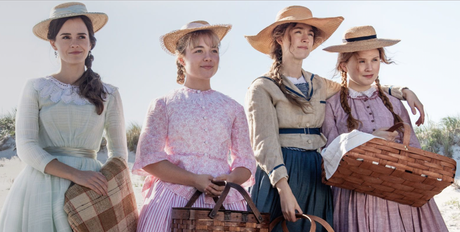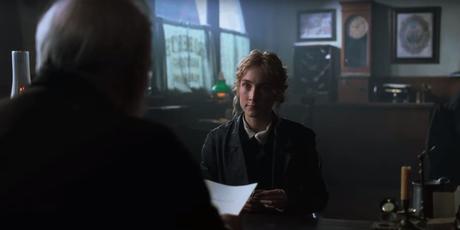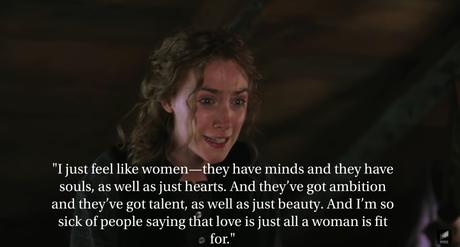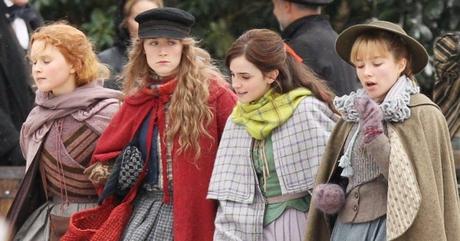
Like Narnia, Hogwarts, Middle Earth, or that cinematic galaxy far, far away, there exist fictional worlds into which one wishes to retreat time and time again. For me, it's the March house from Little Women, as warm and welcoming as a cup of tea in front of a fire. Several film adaptations of Louisa May Alcott's novel exist, but Greta Gerwig has crafted a version that feels fresh and essential. As I was watching the film, the word "lively" came to mind, but that's an insufficient adjective. Gerwig's film is alive, recounting the story of the March family's joy, heartbreak, and struggle in a way that feels both warmly inviting and revelatory.

As with Gerwig's Lady Bird, much of the success stems from flawless casting. Gerwig has again turned to the always-brilliant Saoirse Ronan to be her lead, Jo, and, really, which spunky, independently minded young girl didn't want to be Jo when she grew up? Rounding out the March clan is Laura Dern as the matriarch, Emma Watson as Meg, who chooses love and a life of poverty, Eliza Scanlon as Beth, the musical sister who seems too pure for this world, and Florence Pugh as Amy, the artistic sister who also sees the economical connection between choosing a spouse and the life she'll be allowed to lead. Just as charmed by the March sisters are Laurie ( Timothée Chalamet), the wealthy, rebellious youth who finds himself under the spell of the March sisters and his grandfather (Chris Cooper), whose affectionate bond with Beth becomes one of the film's most emotionally devastating plot strands. Meryl Streep as the feisty, disapproving Aunt March, whose role has been increased for the film, rounds out the stellar cast.
Unlike the novel, which followed a linear narrative path, Gerwig opens the film with Jo on her own in New York, struggling to become a writer and forming a bond with Professor Bhear (Louis Garrel), who is her harshest critic because he sees how brilliant she truly is. A request she return home leads to an intercutting of her present with reminiscences of a past spent at home with her mother and sisters. Juxtaposing events from Jo's present with her past manages to cinematically open up the film without drastically altering the text, while some of the film's more heartbreaking moments land even harder when juxtaposed with a parallel even from her past.

Little Women is a story about choices and the way in which those choices narrow down endless possibilities into one path, and contrasting the ebullience of the past with the harder choices and circumstances of the present makes the film an emotionally richer experience. Each character's choice feels valid and well-regarded, whether it's pursuing a life of independence or choosing to start a family. For a story that has been adapted as many times as this one has, the fact that this film feels so fresh and vital is something of a minor miracle.
Not to shortchange any of the characters, as this film even manages to give the shallow-on-the-surface Amy more nuance than is often the case, but Little Women belongs to Alcott surrogate Jo (a parallel this film makes clearer than most), and Ronan reminds us here why she's one of the greatest actors of her generation. She crafts a Jo that is spirited, proud, and fierce, desperate to be a writer and blessed with the talent to get what she wants, but never lets us forget the love and vulnerability that rests beneath her brio. Despite her talent, she's reduced to writing female characters who must end her story either "married or dead," as her publisher Mr. Dashwood (Tracy Letts) puts it when she wants to write something more powerful.

Take the moment in which Jo distills the film's theme down to its bare bones: "I just feel like women-they have minds and they have souls, as well as just hearts. And they've got ambition and they've got talent, as well as just beauty. And I'm so sick of people saying that love is just all a woman is fit for. I'm so sick of it." Alcott understood the cruelty of reducing an entire gender down to its basest drives, but then Jo adds, "But I'm so lonely." That caveat cuts the heart of her character's conflict, the idea that to admit to wanting love means somehow betraying the thesis of her previous statement. Both Alcott and Gerwig recognize the poignancy and universality that comes from those two, seemingly at odds, emotional pulls.
Gerwig clearly loves the source material, injecting the same lived-in intimacy and natural chemistry between the film's female-dominated family that she brought to Lady Bird. It's a lovely, delicate balance that she effortlessly maintains. Really, though, what gives Little Women its power is the fact that the story feels timeless. The conflicts and emotional yearning Alcott's characters feel continue to resonate for a modern audience, and though the time period is long past, nothing about the characters feels dated. There's a moment in which Marmie counters Jo's claim that she's patient to the point of piety with the revelation that she's "angry nearly every day of [her] life." Neither the film nor the novel dismiss female anger or despair, but they also do not shortchange the familial warmth and humor that permeate the March household. Gerwig emphasizes the characters' timelessness by giving the March women costumes that feel bohemian, counter-culture, and just slightly out of step with the times.

At a time in which our world feels cold, ugly, and unfeeling, wrapping up in the comforting arms of Little Women feels like a welcome, necessary respite. It's an expertly crafted, exquisitely acted, flawlessly directed adaptation of a novel that continues to captivate all who fall under its spell. The film is the cinematic equivalent of a perfect Christmas gift you weren't certain you were worthy of receiving, complete with a perfect ending that recontextualizes the novel's ending in a way that feels both in keeping with novel's spirit while also tweaking it for a modern audience in a way that feels gloriously revelatory. If one ends the film in tears, perhaps having shed them many, many times, it won't be a surprise. After all, it's a glorious, complex story, with its 19 th century Massachusetts setting only making it appear as though it's a quaint, simple narrative.
In the weeks leading up to Little Women 's release, there has been discussion about how it would appeal to male viewers. I can't speak to whether or not it will appeal to male viewers. I saw it with my mother, in a sold-out, overwhelmingly female audience. Instead, I want to answer this in two ways:
It doesn't really matter if it appeals to men. Stories about well-rounded, dynamic female characters dominate the narrative can belong to female viewers, and it's okay for a story in which romance occurs but is not the focal point to target a female audience. Having said that, Jo's struggles, and therefore Alcott's struggles, to not have her work dismissed by a male publishing body continue to feel relevant to a contemporary audience in a time in which women still struggle to have their voices heard and praised in male-dominated entertainment industries or when rules governing women's bodies and choices are made by male-dominated sects. We still have to contend with the perception that a story with a male protagonist can be for either men or women, but a story with a female protagonist is made exclusively for a female audience.
That's why Alcott's story continues to resonate. Jo's struggles are our struggles. What Gerwig has also reminded us of, though, is that our goals and hopes are our own as well, and though our choices eventually narrow as we grow up, we are still capable of finding our own happiness and fulfillment.

